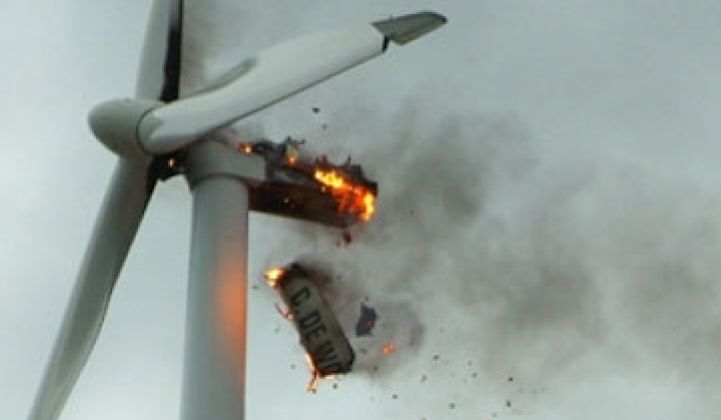The numbers are impressive -- but not in a good way. "It is dismal and getting worse," said American Wind Energy Association (AWEA) CEO Denise Bode about the numbers in the just-released AWEA Mid-Year 2010 Market Report.
It is now irrefutably obvious, according to Bode, that the failure of Congress to provide a long-term mandate for renewable energy is causing utilities across the country to choose natural gas and coal over wind.
"In the first half of this year, we are down 70 percent in terms of wind installation," Bode said in introducing the report. In addition, she said, "we continue to see a drop in new manufacturing activity." Speaking with rising passion, Bode said the U.S. had dropped to third place, behind both the European Union and China, in new wind installations. Describing the U.S. wind industry's circumstances as "dire," she went on to say, "We need action."
The 700 megawatts (MW) of new installed capacity in the second quarter brought the wind industry's 2010 total to 1,239 MW, a remarkable 71 percent below the 2009 number and 57% below the 2008 number.
The report comes just as Senate Majority Leader Harry Reid (D-Nev.) is poised to bring forward a starkly scaled back energy bill proposal for debate. The renewable energy industries and a broad coalition of supporters ranging from the United Steelworkers to the Union of Concerned Scientists are up in arms because Reid's legislation does not include a Renewable Electricity Standard (RES) mandating that utilities obtain a portion of their power from renewable sources over the next ten years.
"We are going to see jobs lost," Bode said. The wind industry needs an RES to provide a long-term market signal to manufacturers and developers. Without it, Bode foresees "the loss of the most exciting, most explosive new sector in the economy." Bode termed Reid's announcement that an RES will not come from Congress this year, "unbelievable" and "incomprehensible."
Liz Salerno, AWEA's Director of Industry Data and Analysis, clarified some of the less "impressive" numbers in the report. There are over 5,000 MW of new wind power capacity under construction right now, she said, but that is largely because Recovery Act funding will only go to projects that get shovels in the ground by the end of 2010. "We're really not seeing a lot of pipeline development behind that, basically putting us on a cliff," Salerno said.
AWEA expects the total for 2010 to be 25 percent to 45 percent below 2009. What makes such numbers especially "dismal," the descriptor used by both Bode and Salerno, is that they suggest an even worse 2011 if Congress does not act. Though Recovery Act provisions held the industry up in 2009, only longer-term policy supports will alter the current pattern of faltering new demand, disappearing new power purchase agreements (PPAs) from utilities, and dwindling plans for new manufacturing facilities.
The pending Senate legislation Reid is expected to introduce today is not expected to contain an RES, despite the fact that both former Senate Majority Leader Tom Daschle (D-SD), now working as a consultant to AWEA, and Bode refute Reid's claim that there are not the filibuster-breaking 60 votes to pass it.
"We have over 60 votes, bipartisan votes, for an RES," Bode said. "Yet we're not being allowed to bring it up," she said, adding that without the RES the wind industry could "wilt on the vine because we can't take action when there is clear bipartisan support." Bode also pointed out that recent polls put voter support for an RES at 70 percent to 80 percent. Further, this policy measure would add nothing to the federal budget and would likely increase federal revenues.
Backing up her claim of bipartisan support for the RES, Bode mentioned backing from Democrats as well as from moderate Republican Senators Charles Grassley (R-IA) and Byron Dorgan (D-ND) and an offer from conservative Senator Sam Brownback (R-KS) to sponsor an RES-containing amendment to Reid's bill.
Bode challenged the speculation that the 60 votes backing an RES might conflict with obtaining 60 votes for the Reid bill. "Show me the 60 votes for the [Reid] package," she said. "We know we have over 60 votes and bipartisan support. Where is the bipartisan support for that package?"
AWEA had no comment on the speculation that both parties are happy to keep the renewables on the hot seat and use them for a campaign issue in the upcoming November midterm elections.



